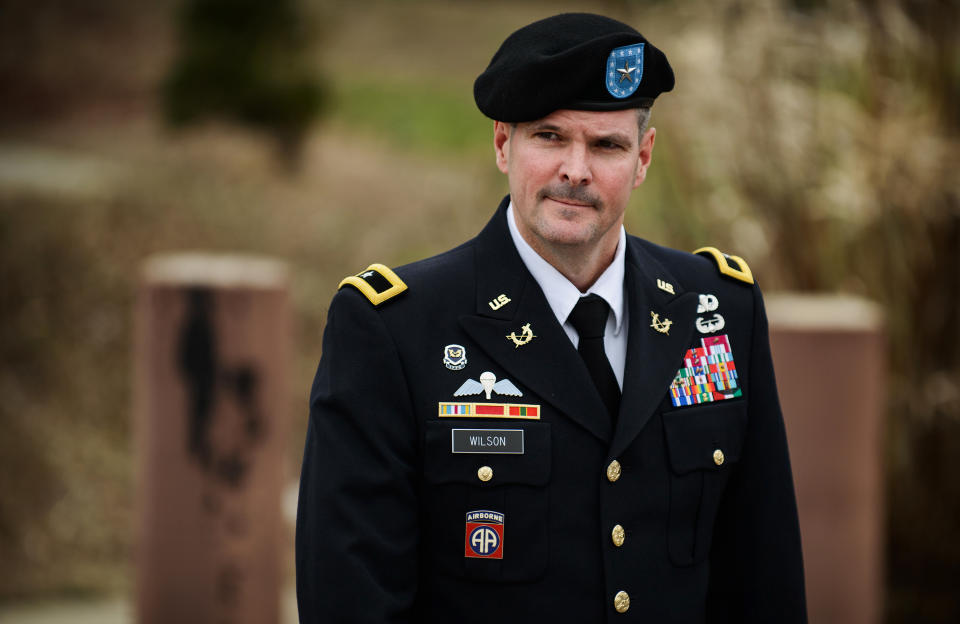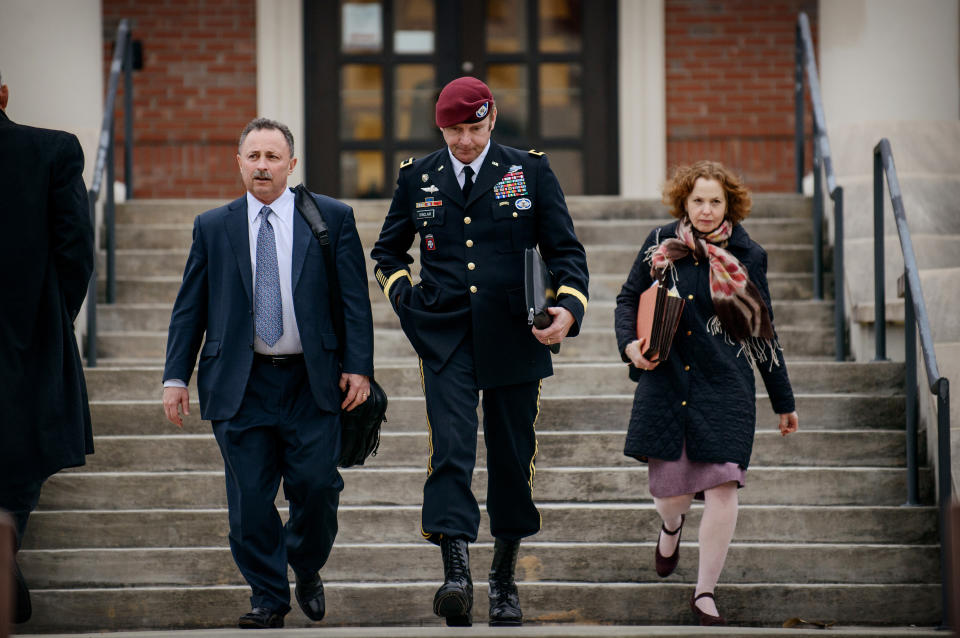New evidence could threaten Army sex assault case
RALEIGH, N.C. (AP) — A military judge was considering Monday whether a high-ranking lawyer at the Pentagon unlawfully interfered in the case against a brigadier general charged with sexual assault, threatening the closely watched court martial.
The latest twist in the case comes at a time when the Pentagon and Congress are grappling with the problem of sexual assaults within the military ranks.
After lawyers for Brig. Gen. Jeffrey A. Sinclair presented the new evidence Monday morning, military judge Col. James Pohl dismissed the jury for the rest of the day. Pohl then heard arguments and testimony about whether he should dismiss some or all of the remaining charges against Sinclair.
At issue is an email chain from December between the prosecution team at Fort Bragg and a top Pentagon lawyer regarding a potential plea deal that was ultimately rejected. It is unlawful in the military justice system for senior commanders outside the chain of command to interfere in prosecutorial decisions.
A female captain with whom the married general admits having a three-year affair says he twice force her to perform oral sex while they were stationed in Afghanistan in 2011. Sinclair is believed to be the highest ranking U.S. military officer to ever face trial for sexual assault.
In a December 16 email, the deputy staff judge advocate at Fort Bragg, Lt. Col. James Bagwell, corresponded with Brig. Gen. Paul Wilson, the assistant judge advocate general for military and operational law based in Washington.
At the time, Bagwell was advising Fort Bragg's top commander on whether to accept an offer from Sinclair to plead guilty to some of the lesser charges in exchange for the Army dropping the sexual assault charges.
In the email, Bagwell asked Wilson for his opinion about the plea offer. Bagwell testified Monday that he later spoke with Wilson by phone. Wilson was previously stationed at Bragg and Bagwell described him as mentor.
"We very briefly discussed our personal opinions on the case," Bagwell said. "He gave me his opinion."
However, Bagwell testified that Wilson, a superior officer, never directed him on what he should do.
Lt. Gen. James Anderson, as the commander of the base, made the final decision to reject the plea offer. Testifying from Afghanistan by telephone, Anderson said the only thing he weighed to make up his mind was the opposition of Sinclair's primary accuser to the deal.
Last week, Pohl ruled against a defense motion alleging improper command influence after pressing Sinclair's lawyers to provide any evidence such interference took place.
As part of their trial preparations, the defense had repeatedly asked to review emails sent or received by lawyers and commanders involved with the case. Prosecutors had opposed handing over the emails.
But on Saturday, prosecutors did hand over the emails now at issue, saying they had just received them in recent days. By law, prosecutors are required to hand over any evidence that might be helpful to the defense.
Richard Scheff, the general's lead defense lawyer, told the judge Monday that the Army had been stonewalling him for months.
"Every time we asked for these, the government has said we were going on a fishing expedition," Scheff said. "And each time, we catch fish."
Pohl appeared frustrated with prosecutors, peppering them on why they had failed to hand over the emails prior to last week's hearing on the issue.
"I am telling them they had to show me something and (the government) had these emails in their possession," Pohl told the lead prosecutor. "How do we know what else is out there at this point?"
In a December letter sent by her attorney, the female captain at the center of the case opposed the proposed plea agreement. The Associated Press generally does not name those who say they were sexually assaulted.
Writing on behalf of her client, Capt. Cassie L. Fowler suggested the proposed deal would "have an adverse effect on my client and the Army's fight against sexual assault."
"Acceptance of this plea would send the wrong signal to those senior commanders who would prey on their subordinates by using their rank and position, thereby ensuring there will be other victims like my client in the future," Fowler wrote.
Pohl has previously expressed concern that Fowler's letter improperly tied whether to accept Sinclair's plea to the political climate surrounding the case, rather than the strength of the evidence against the general.
Though prosecutors deny any consideration was given to Fowler's comments about the potential political fallout of dismissing the sexual assault charges, the emails turned over to the defense Saturday show they did discuss the assertions made in the letter.
After Pohl denied the defense motion last week, Sinclair pleaded guilty to three lesser charges involving adultery with the captain and improper relationships with two female Army officers. Adultery is a crime in the military.
A trial then began on the remaining sexual assault charges.
When reviewing the emails, the judge will likely be trying to figure out whether the Pentagon attorney was asked to give his opinion or was issuing orders to a subordinate, said Walt Huffman, a retired Army major general who was the Judge Advocate General of the Army from 1997 to 2001.
"Is this a reflection of two lawyers batting back and forth what is the right thing to do here? Or is this a command edict from on high saying you may not take the plea deal?" said Huffman, now a professor at Texas Tech University's law school.
Without seeing the emails, Huffman didn't want to speculate on what the judge might do. But in general, if he determines a superior lawyer crossed the line, he can dismiss the charges, either with prejudice, so they can't be refiled, or without prejudice, allowing prosecutors to file charges at a different base to get rid of any improper influence.
But since Wilson is so high up at the Pentagon, finding a new jurisdiction might be impossible, Huffman said.
"There are a lot of unusual things about this case that are almost without precedent," Huffman said. "It's going to be a challenge for the judge and jury to get all this right in this atmosphere."
___
Associated Press writer Jeffrey Collins in Columbia, S.C., contributed to this report.
___
Follow Associated Press writer Michael Biesecker at Twitter.com/mbieseck


